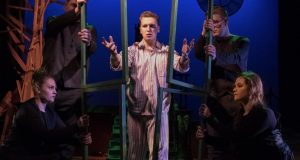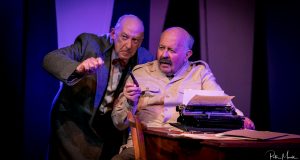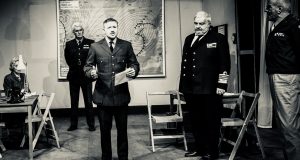REVIEW: Shadowlands by William Nicholson
I trust that the cast of this play has not had to await a review to know whether they done good. But just in case, guys and gals, you done good. You done really good.
The play Shadowlands by William Nicholson follows the life of CS Lewis (“Jack”) insofar as it is touched by the American poet and writer Joy Gresham (nee Davidman). The donnish world is shown as one where intensity is expressed in clever duelling and in the formulation of theoretical positions: “Our loving God allows us to suffer because otherwise we will not seek him”. In walks Joy, apple-carts are duly upset and Jack is drawn into a world of intellectual delight and closeness but does not understand that he is in love until tragedy strikes. On the point of her death, he finally recognises the depth and nature of his feelings and by a stroke of fortune (magic?), remission strikes and Joy and Jack are given three years of loving marriage.
David Morley’s performance as Jack gave us all the intensity we needed for this tough play to work. From the earliest scene, Jack’s light-feeling lecture rationalising suffering, to the overthrow of any rationalisation in the final moments of raw pain – there was no moment in which his turmoil did not feel real and present. All of the relationships were vital and dynamic. Caroline Gurden, (Joy) clearly understood that it was only a deep empathy with Jack that allowed Joy to temper her American directness sufficiently to melt rather than try to smash his English public school reserve. Also delightful was the brothers’ closeness, with Stephen Whitehead as Warnie a (mostly) calm presence whose interjections expertly lifted out warm and humorous colours. A surprising moment was the kindness and human understanding shown in the end by ascerbic don Christopher Riley, finely played by Dominic Campbell. Part of this moment was Christopher’s juxtaposition with the beautifully portrayed failure of Rev. Harry (Jonathan White) to come up with any solace. And Joy’s son Douglas (Leo Jones) was played with just the right feel of self-effacing composure.
There really were no weak links. The screened backdrops enabled a simple staging allowing us to focus on the cast, and costumes and light all played their part in making this creation by director Jenny Lloyd-Lyons one amongst the most emotive shows I’ve seen at the Stables.
Margaret Blurton














